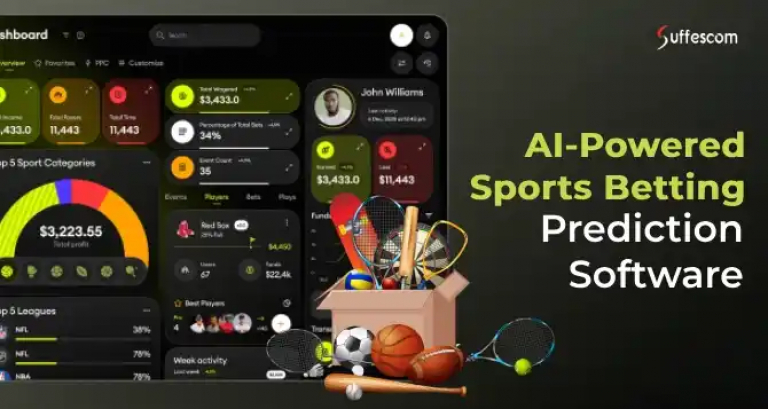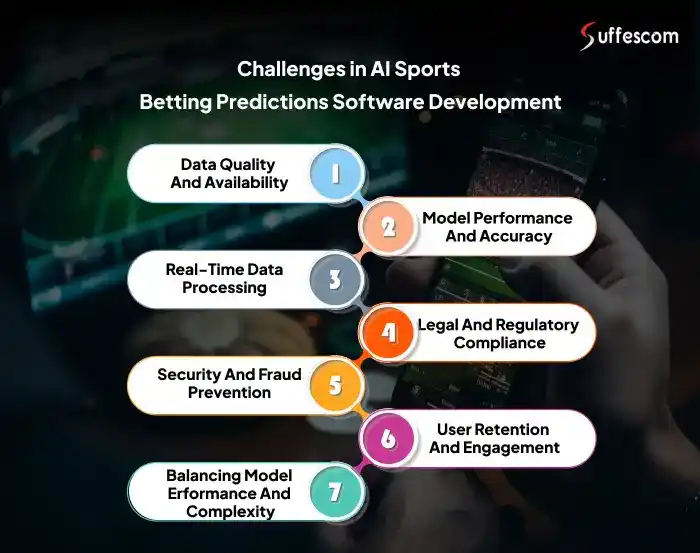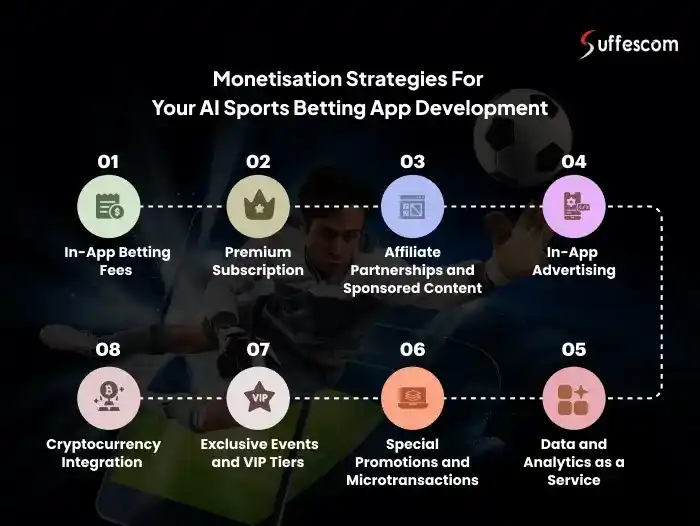Step-by-Step Guide To Develop AI-Powered Sports Betting Prediction Software

The Global Sports Betting Market is witnessing unprecedented growth, with its size estimated to be approximately USD 232.53 billion by 2032. Artificial Intelligence (AI) has revolutionised numerous industries over the past few years. With the vast amount of data generated daily from sporting events, betting platforms have increasingly adopted AI sports betting predictions to improve prediction accuracy, enhance the user experience, and gain a competitive edge.
The Role of AI in Sports Betting Predictions App Development
Integrating AI into a Sports betting app enhances decision-making by processing vast datasets, identifying patterns, and predicting outcomes, with remarkable accuracy. AI transforms the way sports Betting prediction apps operate by introducing sophisticated data analysis and prediction capabilities.
These apps utilise AI-driven technologies to provide bettors with insights that enable them to make informed predictions based on historical data, real-time statistics, and external factors such as weather conditions and player injuries. AI ensures a more objective and data-backed approach to placing bets.
Note - This Post is only for App and Software Development
We are an IT company, offering casino, betting or gambling app and software development services only.
How AI Enhances Prediction Accuracy
AI supports Machine Learning models to analyse historical sports data, player statistics, and weather conditions. Ranging from past data analysis to player statistics and even real-time variables like weather conditions, the patterns of these algorithms are often undetectable by humans. This Approach enables betting platforms to generate in-depth and precise data, driven by predictions, giving users a tremendous edge and elevating the quality of sports Betting AI software.
The personalised capabilities of AI betting software give betting platforms a distinct competitive advantage. AI-driven apps gain a deeper understanding of user behaviour, enabling them to provide real-time predictions that further enhance both prediction accuracy and the overall betting experience.
In the rapid growth of the betting industry, valued at USD 83.65billion in 2022 and projected to grow at a CAGR of 10.3% from 2023 to 2030. AI becomes essential for platforms aiming to secure and retain users.
Build an AI Sports Betting Prediction System
Overview of the US Sports Betting Market
The US sports betting market has grown exponentially since the 2018 Supreme Court ruling, and significant developments are expected in the 2024-25 period, which will likely reshape the industry. With an increasing number of states legalising sports betting, millions of users are now engaging in betting activities across various sports and leagues. Understanding market trends, user behaviour, and competition is crucial for businesses to enter this profitable market.
Growing Drivers
Several key factors contribute to the rapid growth of the US sports betting market. Chief among them is the steady expansion of legalisation. The legal expansion includes states 38-39, plus D.C., with continued legislative momentum. Mobile and online betting platforms have emerged as dominant forces, accounting for over 90% of all wagers due to their convenience and accessibility.
Competitive Landscape
A handful of major players currently lead the competitive landscape. FanDuel and DraftKings dominate the market, boasting strong brand recognition and early-mover advantages. Other key operators include BetMGM, Caesars Sportsbook, and Bet365, all of which are actively expanding across newly legalized states. Meanwhile, emerging platforms such as Kalshi and Polymarket are experimenting with alternative formats, including prediction markets, which are regulated by the Commodity Futures Trading Commission (CFTC).
Diverse Demographics
Sports bettors come from diverse age groups and economic backgrounds. While younger audiences prefer mobile apps, older demographics tend to lean toward desktop-based platforms.
Popular Sports and Leagues
The NFL, NBA, MLB, and NCAA are the most popular leagues in the US sports betting market. Soccer, tennis, and UFC betting have also gained popularity in recent years.
Social Challenges
Despite its explosive growth, the industry faces significant challenges. Concerns about gambling addiction are on the rise, particularly among younger demographics who are heavily targeted through mobile apps and digital ads.
| Area | Snapshot (2024–2025) |
| Market Size | ~$13.7 B GGR in 2024; projected $18.5–18.9 B in 2025 |
| Growth Rate | ~8–11% CAGR through late 2020s |
| Industry Drivers | Legalisation expansion, mobile betting dominance, and data‑driven features |
| Leading Operators | FanDuel, DraftKings, BetMGM, Bet365 |
| Emerging Competitors | Prediction markets like Kalshi & Polymarket |
| Sector Risks | Regulatory fragmentation, addiction concerns, and sports integrity threats |
Types of Sports Betting Apps: Which One Suits Your Business
The sports betting industry offers various kinds of betting, tailored to different user preferences and business models. For B2B clients aiming to develop a sports betting platform, understanding these types is crucial to align the app's functionality with market demand and expectations. Here's an overview of the most common types of sports betting apps, each with its unique features and technical requirements.
Esports Betting Apps
The rise of competitive gaming and esports betting app has gained popularity; these apps focus on tournaments and matches. Here are some of the most well-known and reputable esports betting apps: Bet365, Betway, GGBet, Thunderpick, and Pinnacle.
Traditional Sports Booking App
These apps allow users to place bets on a wide range of sports and events with fixed odds. Traditional sportsbooks are the most common and offer straightforward betting options such as moneyline, spread, and over/under bets. Here are some of the most well-known and reputable Traditional Sports Booking Apps, which are known worldwide: OpenPlay, Playfinder, BookMySports, CourtReserve, Eversports, and OpenSports. Specifically in India, popular apps in this category include Playo, Hudle, and KheloMore.
Live/In-play Betting App
The in-play betting app enables users to place bets while a sporting event is in progress. For a live and engaging betting experience, several apps offer in-play betting features, allowing users to wager on events as they unfold in real-time.
Peer-to-peer (P2P) betting Apps
The ultimate P2P sports betting exchange that revolutionises the way users play, predict, and win! Unlike traditional sportsbooks, ProphetX is a peer-to-peer betting exchange where users play against other users, not the house, ensuring better odds, bigger winnings, and a more innovative way to play. It requires complex matchmaking algorithms, escrow services for funds, and a strong dispute resolution mechanism.
Exchange betting Apps
Similar to peer-to-peer (P2P) betting, exchange betting apps facilitate betting exchanges where users can both back and lay bets. This fosters a more competitive and dynamic betting environment, with the potential for better odds and greater control over the betting process. Here's a list of some of the top betting exchange apps: Betfair, Betdaq, Smarkets, Matchbook, CRICKEX, 1Win, 1xBet, Mostbet, and Indibet.
Fantasy Sports Betting Apps
These apps combine elements of social gaming and betting, often incorporating season-long competitions, cash prizes, and in-app purchases. To stay competitive and captivate modern users, businesses must develop AI fantasy sports predictions that deliver real-time, data-backed insights and strategic recommendations.
Features for an AI Sports Betting App Development
To develop a competitive and ai sports betting app, integrating AI-powered features is essential for providing predictions based on historical data, a personalised user experience, and secure transactions. Here are the key features to consider.
1. Data Collection and Processing Module
Enables the app to gather real-time and historical data from multiple sources, including sports APIs, player statistics, weather conditions, and betting odds. This forms the foundation of AI predictions.
2. Prediction Algorithms
AI models analyse data trends to generate accurate betting predictions and odds, enhancing user trust and engagement.
3. UI/UX Design
User-friendly, responsive, and visually appealing interfaces that ensure seamless navigation across all devices.
4. Interactive Elements
Gamified elements, such as swipe betting, quick polls, and mini-games, are used to keep users engaged beyond regular betting.
5. Personalised Dashboard
Offers users a tailored experience by showcasing preferred sports, bet types, predictions, and stats based on their activity.
6. Live Notifications and Updates
Instant updates on match outcomes, bet results, and key game moments to keep users in the loop in real time.
7. Voice and Chatbot Integration
AI-powered sports betting prediction platform solution utilise virtual assistants to assist users in placing bets, answering queries, and providing betting suggestions through voice or chat.
8. Real-time Notifications and Alerts
Push alerts about changing odds, last-minute betting tips, or injury news to help users make timely decisions.
9. Secure Digital Wallet Integration
Supports multiple payment gateways and ensures encrypted transactions for deposits, withdrawals, and bonus credits.
Benefits of Using AI-powered sports betting prediction platform solution for Business
Integrating Artificial Intelligence into sports betting app solutions isn't just a tech trend; it's a competitive advantage. AI enhances the operational efficiency, user experience, and profitability of betting platforms. Here's how:
1. Real-Time Odds Management
AI algorithms analyse massive amounts of live game data and market trends to automatically adjust betting odds in real-time. This ensures your platform offers competitive and dynamic odds that maximise margins and reduce manual intervention. The business impact is Higher profitability and reduced latency in odds adjustments.
2. Increased Automation
From managing bet placements to calculating payouts and handling user queries via chatbots, AI helps automate key operations. This reduces dependency on large support teams and minimises human error. The business impact is Lower operational costs and 24/7 seamless app performance.
3. Enhanced Fraud Detection
AI models can detect unusual betting patterns, multiple account fraud, location spoofing, and other forms of suspicious activity. These systems flag and block suspicious activity in real-time, reducing risk and maintaining platform integrity. The business impact is Stronger security, reduced financial fraud, and higher trust among users.
4. Improved User Engagement
AI personalizes user journeys by analyzing preferences and behavior. From tailored dashboards to recommended bets and timely alerts, AI keeps users engaged and encourages repeat activity. The business impact is Better retention rates and increased lifetime value (LTV) of users.
5. Data-Driven Insights
AI tools transform complex data into actionable business intelligence, enabling the identification of profitable markets, tracking of user trends, and prediction of revenue growth. Platforms also benefit from betting tips AI prediction models, which use historical and real-time data to generate innovative, personalised betting suggestions that can be marketed as premium features.
10 Key Steps of AI Sports Betting Predictions Software Development
Step 1. Market Research & Compliance
The sports betting landscape, user demand, and ensuring legal compliance with local and international regulations require reliable resources.
Step 2. Define Features & Requirements
This feature outlines your app's core functionalities, supported sports, including the prediction types, target users, and monetisation methods.
Step 3. Data Acquisition & Preparation
Collect the historical and real-time sports data from reliable and known sources or APIs. Clean, label, and structure it for machine learning use.
Step 4. AI Model Selection & Training
Choose algorithms (e.g., regression, neural networks) to train on past outcomes, player stats, and other relevant data points.
Step 5. Backend Architecture Development
Build a robust backend with APIs that connect AI predictions to the user interface, sportsbooks, and databases.
Step 6. Frontend & UI Design
Design a responsive, user-friendly interface displaying predictions, live scores, betting odds, and historical accuracy.
Step 7. Integration with Sports Betting APIs
Connect with betting platforms like Betfair, DraftKings, or custom sportsbooks for real-time odds and wager placement.
Step 8. Testing & Accuracy Validation
Run unit and model validation tests. Fine-tune the AI using accuracy metrics and real-time feedback to optimise its performance.
Step 9. Deployment & Launch
Deploy the software using secure and scalable cloud infrastructure (AWS, GCP). Implement CI/CD pipelines for updates.
Step 10. User Engagement & Continuous Improvement
Adding features such as notifications, leaderboards, or Discord integrations. Monitor model performance and retrain it regularly to improve predictions, enabling users to obtain accurate results from historical data.
Challenges in AI Sports Betting Predictions Software Development
The AI Sports Betting Predictions Software Development is developing AI-powered sports betting prediction software, which presents a unique set of challenges encompassing data, model accuracy, real-time performance, legal compliance, and user experience. Here's a brief breakdown:
1. Data Quality and Availability
Accurate data is essential for AI models to make reliable predictions. However, sourcing high-quality data can be challenging due to inconsistencies, missing values, and unreliable sources. Data preprocessing and validation techniques are essential for maintaining accuracy.
2. Model Performance and Accuracy
Developing AI models that consistently deliver high-accuracy predictions is a complex task. Various factors, such as changing team dynamics, player injuries, and external influences, can affect accuracy, requiring continuous model updates and retraining.
3. Real-Time Data Processing
AI-powered sports betting apps must process vast amounts of real-time data with minimal latency. High-speed data processing infrastructure and efficient algorithms are crucial for delivering instant betting insights.
4. Legal and Regulatory Compliance
Sports betting is subject to strict regulations that vary across different jurisdictions. Ensuring compliance with gambling laws, data protection policies, and licensing requirements is crucial for mobile app developers.
5. Security and Fraud Prevention
AI sports betting apps handle sensitive user data and financial transactions. Implementing encryption, two-factor authentication, and fraud detection mechanisms is essential for maintaining trust and security.
6. User Retention and Engagement
With fierce competition in the sports betting industry, retaining users requires continuous innovation and adaptation. Personalised recommendations, loyalty programs, and user-friendly features enhance engagement and retention.
7. Balancing Model Performance and Complexity
A highly complex AI model may improve prediction accuracy but also requires more computational power, resulting in higher costs and slower performance. Striking the right balance between complexity and efficiency is crucial for an optimal user experience.
Tech Stack and the Process of AI Sports Betting App Development
| Layer | Technologies Used |
| Frontend (User Side) | React Native, Flutter, Swift (iOS), Kotlin (Android) |
| Backend (Server Side) | Node.js, Python (Flask/Django), Ruby on Rails |
| Database | PostgreSQL, MongoDB, MySQL |
| AI & ML Frameworks | TensorFlow, PyTorch, Scikit-Learn |
| Real-Time Data Streaming | Kafka, WebSockets, Firebase |
| APIs & Integration | Sports Data APIs (Sportradar, Betfair API), Payment Gateway APIs |
| Authentication | OAuth 2.0, JWT, Firebase Auth |
| Cloud & Hosting | AWS, Google Cloud, Microsoft Azure |
| DevOps & CI/CD | Docker, Kubernetes, Jenkins, GitHub Actions |
| Security | SSL, End-to-End Encryption |
Monetisation Strategies for Your AI Sports Betting App Development
Developing a successful AI Sports Predictions Software isn't just about accuracy and performance; monetisation plays a vital role in sustainability and scaling. Below are powerful strategies to generate revenue while enhancing user experience:

1. In-App Betting Fees
Charge a small transaction or handling fee on every bet placed. These micro-fees, powered by secure payment gateway integrations, add up and ensure a steady revenue stream without overwhelming users.
2. Premium Subscription
Offer tiered subscription models with access to advanced AI sports predictions, real-time insights, and personalised dashboards. Users pay a monthly or yearly fee for enhanced features and exclusive betting tips generated by your AI development company.
3. Affiliate Partnerships and Sponsored Content
Collaborate with sportsbooks, influencers, or brands. Monetise via affiliate commissions on signups or bets made through your app. Sponsored content, such as betting tutorials or prediction tips, can blend seamlessly into the user's journey.
4. In-App Advertising
Display targeted ads using real-time sports engagement data. Advanced analytics, offered as a Data and Analytics as a Service model, help optimise ad placements and improve ROI for advertisers without disrupting the betting experience.
5. Data and Analytics as a Service
Monetise anonymised user data insights. Sell analytical reports and trend predictions to sports platforms, media outlets, or betting operators. This transforms your app into a data-driven asset, extending its value beyond user interaction.
6. Special Promotions and Microtransactions
Run limited-time challenges, bonus bets, or leaderboard events. Allow users to purchase virtual tokens or prediction boosts via integrated payment gateways, making it easy to engage and spend.
7. Exclusive Events and VIP Tiers
Create loyalty-based VIP tiers. Offer exclusive access to high-value betting events, AI-powered insights, and direct support. This not only increases retention but adds premium appeal for high-stakes users.
8. Cryptocurrency Integration
Enable seamless transactions through cryptocurrency integration. It caters to a global user base, enhancing security, speed, and privacy in betting payments, while also making your platform future-ready.
The Future of AI Sports Betting Predictions
The sports app market in India is experiencing rapid growth, with projections reaching USD 614.2 million by 2030, according to Grand View Research. The market is driven by increasing health awareness, demand for convenience, and technological advancements, such as AI-powered recommendations and live streaming.
Artificial intelligence (AI) is revolutionising the sports betting landscape, providing unprecedented levels of data analysis and predictive capabilities. This shift is revolutionising betting strategies, odds calculation, fraud detection, and customer engagement, leading to a more data-driven and potentially more lucrative experience for bettors.
Despite the advantages, it's crucial to acknowledge the challenges and limitations of AI in sports betting:
- Unpredictability Sports are inherently unpredictable, with factors such as injuries, weather changes, and human errors influencing outcomes, making it impossible to make perfect predictions.
- Data quality is crucial for AI models to rely on high-quality and comprehensive data. Biased or incomplete datasets can compromise the reliability of predictions.
- Ethical concerns, including privacy concerns regarding data collection and analysis, as well as the potential for algorithms to be biased or exploited, necessitate careful consideration.
- Responsible gambling is the effectiveness of AI in personalisation needs to be balanced with features that actively promote responsible gambling practices and prevent the exploitation of vulnerable players.
AI Sports Betting Predictions Software Development
Kickstart your winning streak with powerful AI-driven insights, develop a cutting-edge AI Sports Predictions Software, and get ahead of the game
Marketing and Growth Strategies to Promote Your AI Sports Predictions Software Development
To successfully launch and grow your AI-powered sports prediction software, a multi-channel marketing approach is essential. Below are proven strategies that not only increase visibility but also build trust, drive user acquisition, and boost long-term engagement.
Digital Marketing
Leverage paid ads, search engine marketing (SEM), and display campaigns to target users actively searching for sports prediction tools. Focus on platforms like Google Ads and programmatic display networks to reach a data-driven betting audience.
Influencer Marketing and partnerships
Partner with sports analysts, betting YouTubers, and niche influencers to build credibility and promote app features. Influencers can offer tutorials, live betting streams, or exclusive promo codes to attract active bettors.
Content Marketing and SEO
Publish high-quality blogs, guides, and betting insights that focus on how AI is transforming sports predictions. Optimize your content around keywords like "AI sports prediction engine" or "smart betting algorithms." This helps drive organic traffic over time.
Social Media Engagement
Build active communities on Twitter, Instagram, and Reddit to share live predictions, match analyses, and engage with users in real-time. Engage users with polls, memes, expert picks, and behind-the-scenes content.
Feature Integration: Incorporate a Sports Betting Discord Community Functionality into your app to facilitate daily discussions, share insights, and cultivate a loyal community of bettors.
Push Notifications and In-App Messages
Use behavioral triggers to send push alerts about trending matches, new predictions, last-minute odds changes, or bonuses. In-app messages can guide users to explore features or re-engage dormant users.
Transparency and Trust-Building
Share how your AI models work, display success metrics, and provide bet histories and prediction accuracy rates. Demonstrate that your platform is built on principles of fairness, reliability, and data transparency.
AI Betting Prediction Software As The Best List of Sites
If you're planning to build an AI sports prediction system, there's no better inspiration than the industry leaders already transforming the betting space with advanced AI. Many leading platforms have already proven that AI can drive accuracy, user engagement, and high ROI in sports betting.
BetIdeas
BetIdeas is considered one of the best AI prediction tools for top US sports. It combines deep learning and real-time data analysis to provide accurate betting insights. Replicating this model involves real-time API integration, AI algorithms, and tailored predictions across the MLB, NBA, NFL, and other sports.
Zcode
Zcode has set a benchmark in the industry by combining AI with expert human handicappers to deliver high-accuracy picks. If people are aiming to build a hybrid prediction engine, this model is ideal for their needs. Create a betting prediction software like Zcode that blends machine intelligence with human insights to offer more reliable and flexible predictions to your users.
Sportsprediction.ai
Sportsprediction.ai is an excellent example of a free soccer AI tool that comes with a downloadable mobile app, making it accessible and user-friendly. To target casual and mobile-first users, consider creating a betting prediction software like Sportsprediction.ai, focusing on UI simplicity, live data feeds, and accurate football predictions powered by AI.
DeepBetting.io
DeepBetting.io is gaining attention for its proven profitability and ROI in soccer predictions. To compete in this space, a betting prediction software like DeepBetting.io, which emphasizes machine learning models trained on player statistics, match trends, and the betting market, with measurable profit metrics for users.
Leans.ai
Leans.ai stands out with a long-term ROI of 9%–10%, demonstrating the power of well-trained AI models over time. Create a betting prediction software like Leans.ai by building transparent reporting dashboards and focusing on long-term value predictions, ideal for serious bettors and data-driven users.
SportsAI
SportsAI operates as a Telegram-based AI sports picks bot, delivering predictions where users already spend their time. If you're looking for viral growth and rapid adoption, consider creating a betting prediction software like SportsAI, which integrates prediction delivery into messaging platforms like Telegram or Discord to enhance user engagement and retention.
Building the Future with AI Sports Prediction software solutions with Suffescom:
At Suffescom, we redefine the AI Sports Prediction software solutions experience by focusing on more than just functionality. As a premier AI Sports Predictions Software Development, we fuse innovative technology with strategic insights to build apps that captivate users and drive long-term business growth.
Secure Payment Systems: Our apps feature top-tier security measures, including encrypted transactions and multiple payment methods, to ensure a smooth process, safe financial exchanges, and prioritize top-notch AI Sports Prediction development Solutions.
User Experiences: We focus on seamless navigation, personalized content, and real-time updates to create engaging interfaces that captivate users and keep them coming back.
Real-time Customer Engagement: Our solutions are designed to help businesses connect with users instantly, boosting retention and fostering loyalty through timely promotions and updates.
Adaptability to Emerging Trends: Suffescom ensures your app is future-ready, allowing businesses to respond quickly to new trends and market shifts.
Industry-leading Expertise: With over 500+ White Label Projects delivered, and a team of 1600+ experts. Suffescom is a leading company in this industry, with over 13 years of experience and 25% Cost Savings on Each Project.
FAQ:
1. What Is Included In An AI-powered sports betting prediction platform solution?
An AI-powered sports betting prediction platform solution includes predictive analytics, real-time data processing, and machine learning models to forecast outcomes for sports betting and fantasy sports apps.
2. How Can I Develop AI Fantasy Sports Predictions For My Platform?
To develop AI fantasy sports predictions, you need to integrate player performance data, game statistics, and AI algorithms that simulate outcomes for fantasy teams in real time.
3. What Are The Benefits Of AI Sports Betting Predictions Software Development?
AI sports betting predictions software development improves accuracy in odds prediction, enhances user experience, and increases profitability for sportsbook operators and fantasy platforms.
4. Why Should I Build An AI Sports Prediction System As Part Of MVP App Development?
Building an AI sports prediction system in the MVP app development phase allows us to validate the idea quickly, attract early users, and test the effectiveness of AI-powered insights.







